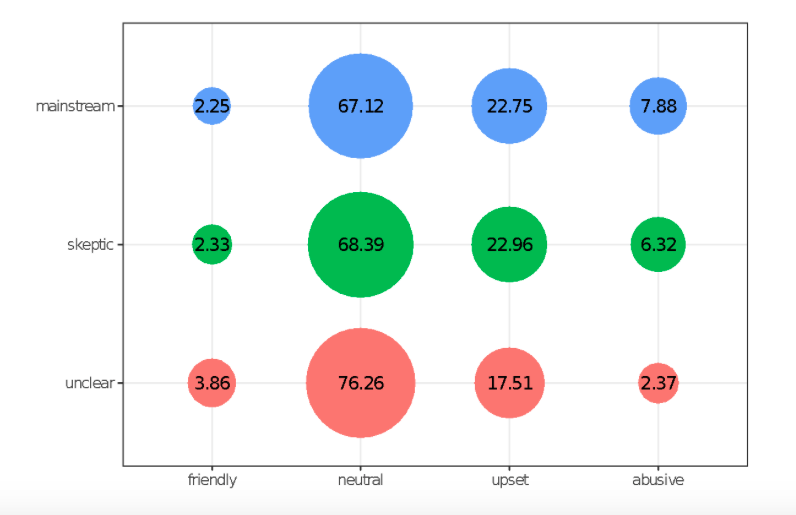Making sense of our connected world

Harmful online speech and the role of collective identities
Harmful speech or hate speech is a tragic part of online communication. By examining the how users talk to each other about climate change in online comment sections of German websites, I highlight the importance and limits of collective identities when thinking about harmful speech.
Imagine this: you’ve just responded to a Facebook post about climate change. You only wanted to highlight that the threat of global warming is real and that something should be done about it, but a few moments later you find yourself in a heated online discussion with a climate skeptic. Neither they nor you are very patient with one another; ad hominems are exchanged, the other one’s intelligence is questioned, and, eventually, the page’s owner deletes your posts. Although the topic can be replaced, these often very colorful clashes, these acts of incivility, happen online all the time. In response, scholars approach online harmful speech from a variety of perspectives, ranging from law (e.g. Banks, 2010), to psychology (Cowan & Hodge, 1996), to informational sciences (e.g. Burnap & Williams, 2014), to societal ones (Papacharissi, 2004). Indeed, looking at online harmful speech through the lens of public sphere theory and thus as a result of clashing factions may help us understand some unexplored aspects of online harmful speech, since one important factor that constitutes a public is collective identity. Based on the example of climate skepticism, I want to highlight the relevance of collective identity for harmful speech, i.e. that we can look at harmful speech online between users from the mainstream who believe that manmade climate change exists and the climate skeptic faction based on their core beliefs and not necessarily due to their individual arguments.
Recent work on climate change skepticism in German online comment sections (Kaiser 2017a, 2017b) could help test this hypothesis. After analyzing over 10,000 online comments written in ten comment sections of four news sites and six climate blogs, it appears that climate skeptics are highly active online and use comment sections as a means to carry their message to the mainstream (Kaiser, 2017b). This clear online rift between the collective identities of mainstream and skeptics, then, might naturally lead to harmful speech from members of the mainstream who read these comments and who may feel provoked by the climate skeptics’ questioning of climate change. But can we see this clash of identities in the data?
To test this idea, I analyzed 1,382 online comments which were written as a response to climate skeptics. The results show that this is not the case (see Fig. 1). Abusive comments in general are rare in this dataset. Although users from the mainstream were slightly more abusive to skeptics, it is interesting to note that skeptics themselves were also abusive to each other (~8 percent to 6 percent) — at first sight, at least. A closer look reveals that although roughly 2 percent of the abusive and 7 percent of the upset comments written by skeptics were written while agreeing with fellow skeptics, the latter group did not react to the skeptics’ abusive or upset comments negatively, suggesting that skeptics were in this case not necessarily abusive of other skeptics but rather of others – most likely the mainstream. In contrast, 7 percent of the abusive and 13 percent of the upset comments written by mainstream users were written while being critical of skeptics. This is only the case for 4 and 8 percent of the comments written by skeptics. This, then shows that although the numbers seem similar at first (see Fig. 1) they differ with regard to how they have to be read and understood.

Figure 1: Tone of online comment replies to climate skeptics per position on climate change in percent (N=1,382). Positions are neutral (n=337), skeptic (n=601), and mainstream (n=444).
Online harmful speech is a serious societal issue that needs to be fought as well as understood. Demonstrating that it can be a product of an underlying clash of opposing publics highlights two important aspects for consideration: 1) harmful speech cannot only have an incredibly damaging effect on an individual level but also may lead to the fragmentation of the public sphere, as harmful speech will likely contribute to a widening of the gap between publics by alienating the ‘other’ side, harshly emphasizing the differences between collective identities and thus enforcing an ingroup-outgroup thinking. 2) Researchers that study online harmful speech should thus also take the context in which harmful speech is spoken into account (e.g. who it is directed at, how the tone differs from the message, etc.) to understand the societal impact of harmful speech. This is especially the case when using computational methods: although the methods often allow us to identify harmful speech, they do not necessarily show us the context.
References
- Banks, J. (2010). Regulating hate speech online. International Review of Law, Computers & Technology, 24(3), 233-239. doi: 10.1080/13600869.2010.522323
- Burnap, P., & Williams, M. L. (2015). Cyber Hate Speech on Twitter: An Application of Machine Classification and Statistical Modeling for Policy and Decision Making. Policy & Internet, 7(2), 223-242. doi: 10.1002/poi3.85
- Cowan, G., & Hodge, C. (1996). Judgments of Hate Speech: The Effects of Target Group, Publicness, and Behavioral Responses of the Target. Journal of Applied Social Psychology, 26(4), 355-374. doi: 10.1111/j.1559-1816.1996.tb01854.x
- Engels, A., Hüther, O., Schäfer, M., & Held, H. (2013). Public climate-change skepticism, energy preferences and political participation. Global Environmental Change, 23(5), 1018-1027. doi: http://dx.doi.org/10.1016/j.gloenvcha.2013.05.008
- Habermas, J. (1989). The structural transformation of the public sphere : an inquiry into a category of bourgeois society. Cambridge, Mass.: MIT Press.
- Kaiser, J. (2017a). Spheres of Skepticism – The Integration of the Climate Skeptic Counterpublic Within the German Networked Public Sphere. Retrieved from https://repositorium.zu.de/frontdoor/index/index/docId/16
http://nbn-resolving.de/urn/resolver.pl?urn:nbn:de:bsz:1141-opus4-164 - Kaiser, J. (2017b). Public Spheres of Skepticism: Climate Skeptics’ Online Comments in the German Networked Public Sphere. International Journal of Communication, 11(April 2017), 1-22.
- Papacharissi, Z. (2004). Democracy online: civility, politeness, and the democratic potential of online political discussion groups. New Media & Society, 6(2), 259-283. doi: 10.1177/1461444804041444
Photo: User:Colin |
| This post represents the view of the author and does not necessarily represent the view of the institute itself. For more information about the topics of these articles and associated research projects, please contact info@hiig.de. |
This post represents the view of the author and does not necessarily represent the view of the institute itself. For more information about the topics of these articles and associated research projects, please contact info@hiig.de.

You will receive our latest blog articles once a month in a newsletter.
Featured topics
The Human in the Loop in automated credit lending – Human expertise for greater fairness
How fair is automated credit lending? Where is human expertise essential?
Impactful by design: For digital entrepreneurs driven to create positive societal impact
How impact entrepreneurs can shape digital innovation to build technologies that create meaningful and lasting societal change.
Identifying bias, taking responsibility: Critical perspectives on AI and data quality in higher education
AI is changing higher education. This article explores the risks of bias and why we need a critical approach.




